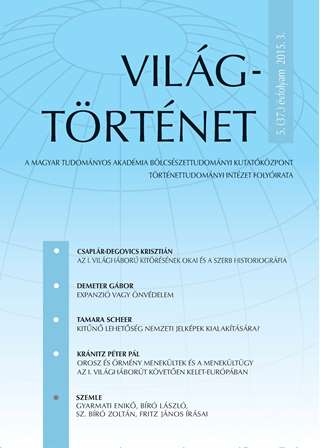Az I. világháború kitörésének okai és a szerb historiográfia
The Reasons for the Outbreak of World War I and the Serbian Historiography
Author(s): Krisztián Csaplár-DegovicsSubject(s): Pre-WW I & WW I (1900 -1919)
Published by: Magyar Tudományos Akadémia Bölcsészettudományi Kutatóközpont Történettudományi Intézet
Keywords: small nationstates; WWI; Balkans; Albania; Serbia
Summary/Abstract: The main thesis of this study is to draw attention to the fact that besides the great powers it was the small nationstates of the Balkans that could be held indirectly accountable for the outbreak of WWI. It does not mean, of course, that both groups of states carry the same weight of responsibility. This paper aims to stress that it was the Balkans and its nationstates that played the role of a catalyst in the outbreak of WWI. The theses above were elaborated in the publications and manuscripts I wrote during the period of 2011–2014 as the beneficiary of the Bolyai Research Scholarship of the Hungarian Academy of Sciences (the project was titled “Between state, nation and locality: The history of Albania 1912–1914”). The arguments and points of view lined up are basically the results of my researching subjects which the historiography turned a blind eye to or neglected to consider seriously. My researches on Albania inevitably touched upon the history of Serbia, therefore, after reviewing my theses, I aim to give a concise summary about how the contemporary Serbian historiography interprets the outbreak of WWI.
Journal: Világtörténet
- Issue Year: 2015
- Issue No: 3
- Page Range: 349-389
- Page Count: 41
- Language: Hungarian

